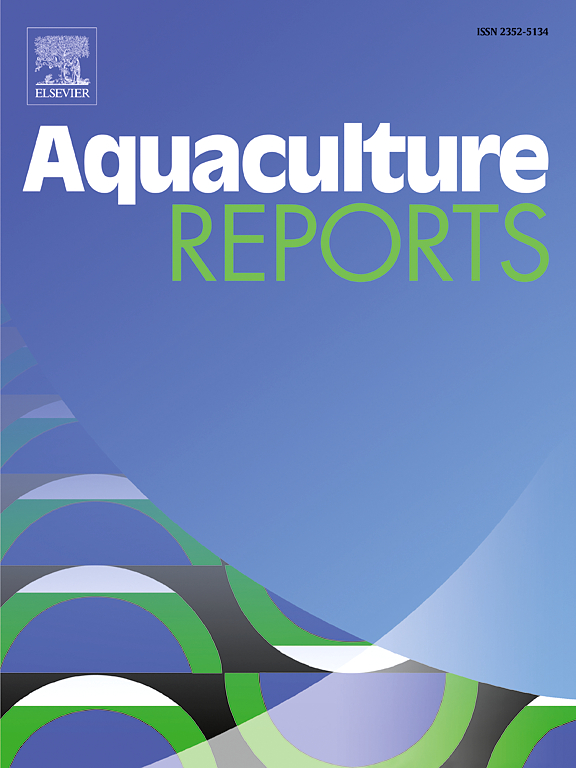半脱脂黑虻幼虫饲料完全替代虹鳟鱼饲料中大豆蛋白的性能和生理后果
IF 3.7
2区 农林科学
Q1 FISHERIES
引用次数: 0
摘要
近年来,水产养殖业越来越多地使用植物性成分替代鱼粉(FM)。然而,使用这些成分所固有的挑战促使人们不断寻找可持续和具有成本效益的替代品。为了研究虹鳟鱼饲料中高昆虫蛋白含量的潜力,建立了一项剂量反应研究,以半脱脂黑虻(Hermetia illucens)幼虫代替高达100% %的大豆蛋白浓缩物(SPC)的效果。在为期10周的饲养试验中,选取初始体重为135.8 ± 15.3 g的同质虹鳟鱼1100尾,饲喂10种不同的饲料:以大豆为基础的对照饲料和以增加比例的黑虻幼虫粕(BSF)代替SPC含量的饲料。所有饲料均添加相同的低鱼粉含量(7.5% %),并分别进行(对照+、25BSF+、50BSF+、75BSF+和100BSF+)和不进行(对照、25BSF、50BSF、75BSF和100BSF)粪便粘合剂处理的试验。在试验结束时,测定生长性能、饲料利用率、脏体指数和鱼片产量,并对肝脏和肠道进行组织学和转录组学分析。结果表明,用BSF替代与采食量的增加和生长的显著(尽管是非线性的)改善有关,这暗示了商业SPC对照的营养不足。然而,饲喂无虫饲料的鱼的蛋白质保留率和饲料转化率(FCR)有所提高。处理之间在肠道或肝脏组织学、基因表达或鱼片加工量方面没有明显差异,这表明即使用BSF完全替代SPC也可以在不影响虹鳟健康或生产力的情况下进行。这项研究是证明用BSF完全替代SPC是可能的,而不会对虹鳟鱼在水产养殖中的表现产生不利影响的先驱,再次强调了这些昆虫在不久的将来作为喂养鲑鱼的替代品的潜力,只要世界各地的法规能够更可持续地生产用于饲料目的的昆虫。本文章由计算机程序翻译,如有差异,请以英文原文为准。
Performance and physiological consequences of completely replacing soy protein in rainbow trout (Oncorhynchus mykiss) diets with semi-defatted black soldier fly (Hermetia illucens) larval meal
In recent years, the aquaculture industry has seen an increasing substitution of fishmeal (FM) with plant-based ingredients. However, challenges inherent in the use of such ingredients drive an ongoing search for sustainable and cost-effective alternatives. To study the potential of high insect protein content in rainbow trout diets, a dose-response study was set up to assess the effects of replacing up to 100 % of soy protein concentrate (SPC) with a meal of semi-defatted black soldier fly (Hermetia illucens) larvae. In a 10-week feeding experiment, a homogeneous group of 1100 rainbow trout (initial body weight: 135.8 ± 15.3 g) were supplied with 10 different feeds: a commercial soy-based control and diets in which the SPC content was replaced with increasing proportions of black soldier fly larval meal (BSF). All diets also incorporated the same low fishmeal content (7.5 %) and were tested with (Control+, 25BSF+, 50BSF+, 75BSF+ and 100BSF+) and without (Control, 25BSF, 50BSF, 75BSF and 100BSF) a faecal binder treatment. At the end of the experiment, growth performance, feed utilisation, organosomatic indices, and fillet yields were determined alongside histological and transcriptomic analysis of the liver and intestine. Results indicated that substitution with BSF was associated with increased feed intake and a significant, although non-linear, improvement in growth, hinting at nutritional deficiencies in the commercial SPC controls. However, fish fed with insect-free diets exhibited improved protein retention and feed conversion ratio (FCR). No significant differences were apparent in intestinal or liver histology, gene expression or fillet processing yield between treatments, indicating that even a complete replacement of SPC with BSF can take place without compromising rainbow trout health or productivity. This study is a pioneer in demonstrating that a complete substitution of SPC with BSF is possible without adversely affecting the performance of rainbow trout in aquaculture, highlighting once more the potential of these insects as an alternative for feeding salmonids in the near future, as long as regulations worldwide enable more sustainable production of insects for feed purposes.
求助全文
通过发布文献求助,成功后即可免费获取论文全文。
去求助
来源期刊

Aquaculture Reports
Agricultural and Biological Sciences-Animal Science and Zoology
CiteScore
5.90
自引率
8.10%
发文量
469
审稿时长
77 days
期刊介绍:
Aquaculture Reports will publish original research papers and reviews documenting outstanding science with a regional context and focus, answering the need for high quality information on novel species, systems and regions in emerging areas of aquaculture research and development, such as integrated multi-trophic aquaculture, urban aquaculture, ornamental, unfed aquaculture, offshore aquaculture and others. Papers having industry research as priority and encompassing product development research or current industry practice are encouraged.
 求助内容:
求助内容: 应助结果提醒方式:
应助结果提醒方式:


